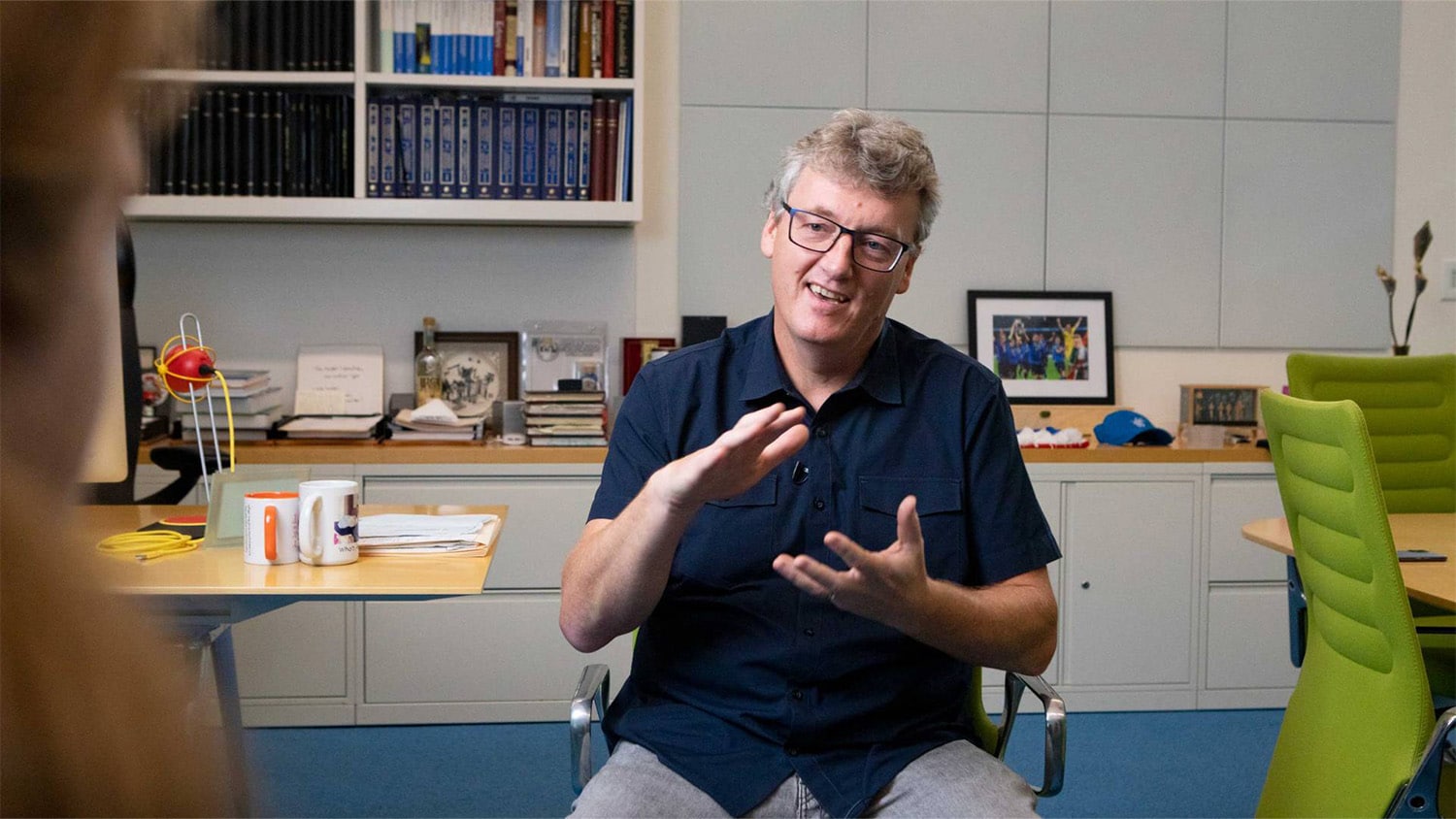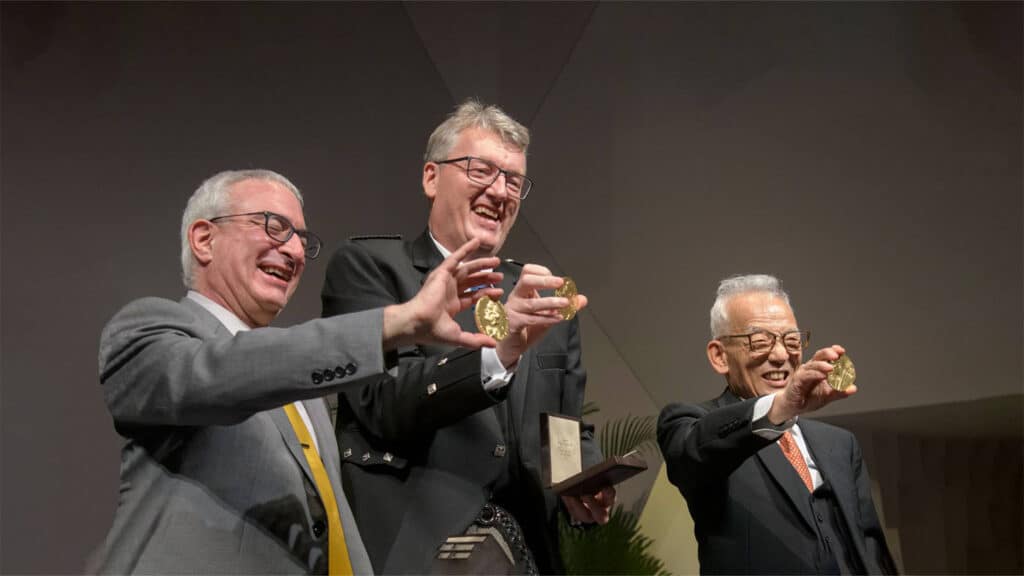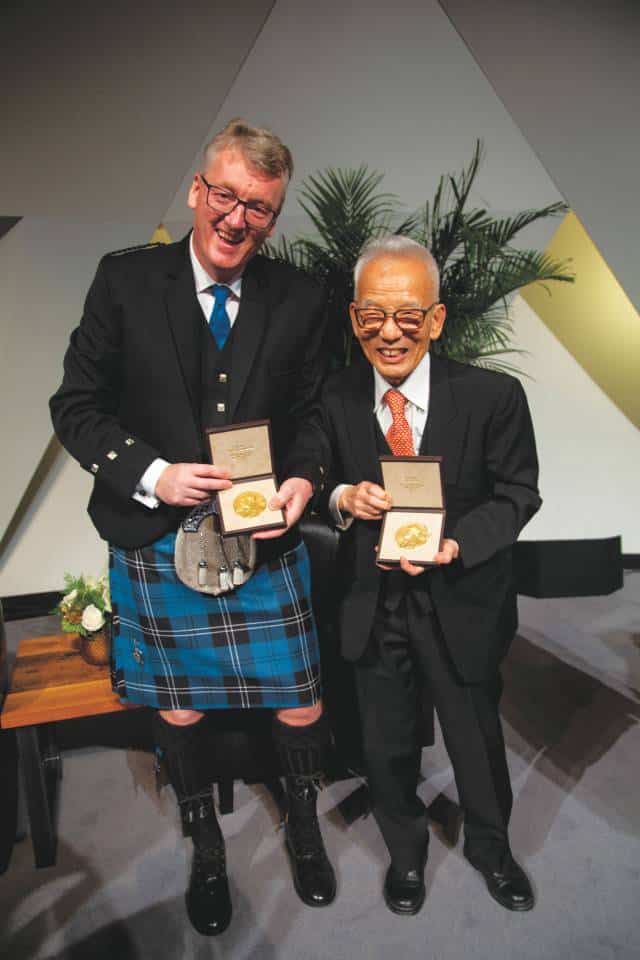MacMillan To Laud Graduates’ Resilience
Nobel laureate David MacMillan, who shared the Nobel Prize in chemistry in 2021, will address NC State’s spring graduating class of some 6,600 students Saturday at PNC Arena. The native of Scotland and professor of chemistry at Princeton will be awarded an honorary degree by Chancellor Randy Woodson.

Sir David MacMillan, an avowed sports fanatic and knighted Nobel laureate, decided to skip class one day as an undergraduate student at the University of Glasgow in his native Scotland. He really wanted to watch the Scottish national soccer team play Cyprus in a World Cup qualifying match at a local pub.
The next day, his professor pulled him aside to say that the previous day’s lesson was on an important topic and he needed to pay closer attention during his undergraduate studies.
“Was it?” MacMillan asked. “Do you really think so?”
As it turns out, yes.
Enantiomers, chemical compounds that are mirror images of each other, are important building blocks that have been at the heart of MacMillan’s groundbreaking work in asymmetric organocatalysis.
“Ironically enough, the lecture I missed turned out to be in the area in which I won the Nobel Prize,” MacMillan says. “I was fortunate that one of my professors pulled me to the side and said ‘This is really important, you should probably learn it.’”

MacMillan, the James S. McDonnell Distinguished University Professor of Chemistry at Princeton, will address some 6,600 NC State graduates at the school’s 2024 spring commencement on Saturday at PNC Arena. Before receiving an honorary degree from NC State Chancellor Randy Woodson, MacMillan plans to applaud their resilience and perseverance, mainly for entering college during the COVID-19 pandemic and pursuing their degrees during one of the most tumultuous eras in American history.
“The classes that have come through [all college campuses] in the last four years are just different, right? Because of all they have been through,” MacMillan says. “They have come out of it successfully. It’s made them so much stronger.
“What I think is happening with students through science, through engineering, through all the things they have been involved with, they are continually making the world a better place.”
What I think is happening with students through science, through engineering, through all the things they have been involved with, they are continually making the world a better place.
That’s been at the heart of MacMillan’s academic and research career. He grew up in a working-class town between Glasgow and Edinburgh, proved himself at the local university and embarked on a career in advanced chemistry with a doctoral degree at California-Irvine, postdoctoral work at Harvard and faculty positions at California-Berkeley and Princeton.
MacMillan shared the 2021 prize for chemistry with German chemist Benjamin List for their work in asymmetric organocatalysis, a process that uses small organic molecules to drive chemical reactions. In 2022, he was bestowed the title of knight bachelor by Queen Elizabeth II for his service to chemistry and science, among the last royal honors given before her death.
Of the various applications of his research, MacMillan is most proud of its ability to develop medicines and other catalytic processes at a low cost because it’s developed by using plentiful organic molecules.
“One of the things I love most about what has happened, based on my background, is that it doesn’t matter how much money or how many resources people have to do this kind of research,” MacMillan says. “When people ask me, ‘Where’s the next big impact gonna be from organocatalysis?’ I always say, ‘I don’t know, but the one thing I know is it’s not gonna be based on who has the most money; it’s gonna be on who has the best idea.’
“That’s an aspect of this that we didn’t see coming.”

Fortunately for Saturday’s group of graduates and their guests, MacMillan has been celebrated for his unique ability to communicate the complicated science behind his and List’s research to audiences, both inside and outside the academic community, all in a lilting Scottish brogue.
He’s an engaging fellow, able to dissect the importance of complex chemistry as a member of an Ivy League faculty while also appreciating the land-grant background of the students he will address at Saturday’s commencement. He has friends on NC State’s faculty and has spoken multiple times at Triangle universities.
“NC State is rightfully viewed as a phenomenal sort of STEM university,” MacMillan says. “The history of the university is incredible, in terms of where it came from, how it continues to grow and how it educates an enormous percentage of the state.
“What I find fascinating is that in a lot of places, students come from all over the world and country and then leave, which is fine and wonderful. But NC State and universities like it are the ones that are really doing so much for the state itself because they educate so many students local to the state who stay local afterwards.”
Being from a working-class region of Scotland, MacMillan also appreciates the opportunities NC State provides for all regions of a state with urban, suburban and mostly rural populations.
That’s why, when awarded the financial benefits of his Nobel Prize of about $500,000, he established the May and Billy MacMillan Charitable Fund to provide scholarships to Scottish students of underprivileged backgrounds like his own. He’s contributed speaking fees since winning the Nobel to that foundation, which has awarded funds for several scholarship programs and educational grants for Scottish students and universities. The fund grew significantly when MacMillan mentioned it on a BBC sports talk show.
“One of the things that really appeals to me also about coming to NC State is that it is a kind of place that appeals to people of all backgrounds and allows something to amplify, be a springboard to want and do really whatever they want in life,” he says. “That’s also very, very true of the U.S. in general. I know people like to knock Americans, but the U.S. is incredible at being able to take people from all over the world and give them springboards for life.
“It took in a working-class guy from a steel-working town in Scotland, allowed me to come in and gave me every opportunity.”
MacMillan grew up on the twin disappointments of being a fan of the Scottish national football team, of which he is now an honorary lifetime member, and the Dallas Cowboys.
I know people like to knock Americans, but the U.S. is incredible at being able to take people from all over the world and give them springboards for life.
So he’s both inherently Scottish and typically American, obsessed with sports and self- and societal-improvement.
“I am such a Scottish stereotype,” he says. “I love soccer, I love golf and I love whiskey.”
His time at American universities deepened his affection for sports, something that began while watching NFL games when they were first introduced to Scottish television in the early 1980s. He’s been a Cowboys fan ever since, along with Major League Baseball’s Los Angeles Angels, the NBA’s Milwaukee Bucks and the NFL’s Las Vegas Raiders, an eclectic group of franchises that have given him almost as many collective heartaches as the Scottish national soccer team.
Will he bring that love of athletics with him to Raleigh this weekend? Let’s just say his family kept an eye on the Wolfpack during the 2024 NCAA men’s and women’s basketball championships.
“My wife is desperate to meet DJ Burns,” he says.
- Categories:


